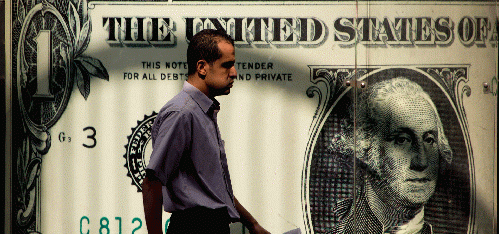At the close of WW2, the US was the world's one economic powerhouse, with unmatched technology and a large portion of the world's manufacturing capacity. Wages and standards of living in the US were higher than anywhere in war-torn Europe (even Switzerland), far higher than in Asia.
But today the US has almost no manufactured exports, and we export agricultural products from plantation farms, much like a banana republic. Weapons are our only hi-tech export. 35 years ago, we went from the world's biggest creditor to the world's biggest borrower, and our debt has been growing exponentially ever since.
So, how is US wealth and prosperity maintained? It's because the dollar is the world's common means of exchange. We're in the business of printing dollars for other nations to trade with. How long can that privilege last, when we go around acting like a bully and making other nations hate us? - JJM
BEIJING -- In January, President Donald Trump took to Twitter to denounce Pakistan's commitment to fighting terrorism. Twenty-four hours later, Pakistan's central bank announced that it no longer would use the U.S. dollar in international transactions, and would instead switch to the Chinese yuan.
Four months later, in response to the Trump Administration's withdrawal from the United States' nuclear weapons pact with Iran, the European Union announced that it would use its own currency, the euro, to pay for Iranian crude oil.
Earlier this month, Moscow and Beijing announced a plan to use their own national currencies in bilateral trade. Russian President Vladimir Putin told reporters that the move would "increase the stability of banks' servicing of export and import operations while there are ongoing risks on global markets."
The Trump administration's bellicosity has combined with the volatility of the global economy to sharply accelerate what has become an international movement: ditching the dollar as the world's reserve currency. When Trump was inaugurated, the greenback was used in nearly 90 percent of all international transactions; today that figure has dropped to roughly two-thirds, according to Shabbir Razvi, the director of International Finance Solutions Associates. As the economist Peter Schiff told RT recently: I think the world is in the process of trying to de-dollarize."
Money makes the world go round, especially if you can print itThe prospect is an ominous one for a U.S. economy that many believe is closing in on perhaps the worst recession in history. International reserve status was closely tied to gold supplies and the British pound was the international reserve currency for all of the 19th century and half of the 20th -- until the 1948 post-war conference In Bretton Woods, New Hampshire anointed the U.S. dollar as the primary currency for international trade.
When the Nixon Administration uncoupled the U.S. dollar from the gold standard, the U.S. brokered a deal to buy oil from Saudi Arabia and provide the kingdom with military aid and equipment in exchange for an agreement by the Saudis to invest petrodollar revenues back into U.S. Treasury bonds. Saudi Arabia held US$164.9 billion in U.S. government debt as of the end of June this year.
The dollar's special status is to U.S. hegemony what Samson's hair was to his super strength. If the dollar were to be replaced as the international reserve currency, the U.S. could no longer pay its bills simply by printing more money. The result, for a country that is no longer the world's dominant exporter on the international market, could cause the economy to freeze up, and possibly produce apocalyptic shortages of fuel and food.
The prime beneficiary of the dollar's decline is clearly China.
Ring out the buck, ring in the yuanAs of the end of the second quarter, overseas institutional and individual holdings of yuan-denominated financial assets totaled 4.9 trillion yuan -- roughly $717 billion -- according to ICBC International, the Hong Kong investment banking arm of Industrial and Commercial Bank of China, one the country's big-four banks. The share of yuan-denominated stocks and bonds as a percentage of total assets held by global investors increased to about 2.5 per cent and 3.0 per cent, respectively from the year-ago period.
(Note: You can view every article as one long page if you sign up as an Advocate Member, or higher).





